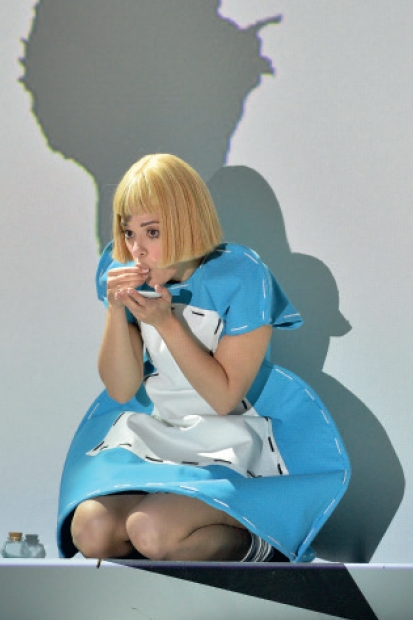Charles Lutwidge Dodgson loved little girls. He loved to tell them stories, he loved to feed them jam, he loved to set them puzzles, and he loved to take their photographs. On 25 March, 1863, he composed a list of 107 prepubescent portrait subjects, arranged alphabetically by forename. Below the Agneses came the Alices, including Alice Liddell, the little girl for whom he created Alice in Wonderland. Mostly good-mannered, occasionally lachrymose and stuffed full of half-remembered governess-led learning, the fictional Alice displays behaviour quite out of step with her age. Instead of doing what she is told to do by the creatures she meets, she behaves like an adolescent (though adolescence was to Dodgson a destructive force) and learns to disobey.
Unsuk Chin’s 2007 opera Alice in Wonderland is not family-friendly. Her Wonderland is a world of sudden and frightening body changes, unreliable information and irrational violence, the worst offenders being the booming, shrieking, baby-beating, head-chopping adult females whose number Alice must eventually join. In Netia Jones’s staging, cleverly extrapolated from Ralph Steadman’s illustrations, a giant eye, perhaps that of Dodgson, blinks from an aperture on the video screen as the orchestra breathes into the first susurration of gongs and Alice (Rachele Gilmore) succumbs to sleep. Her voice is high, pure and clear, her music a frantic calligraphic scrabble of cross-hatched strings, as though describing the scratch and swirl of a nib on paper, the sharp jab of a full stop. ‘Who in the world am I?’ she asks, over a spritz of xylophone. ‘Ah, that’s the great puzzle!’
Chin uses the set-pieces in Carroll’s creation resourcefully. There’s a pleasing vigour to the mad accelerandi in her voicing of the White Rabbit (Andrew Watts), cool beauty in the boys’ choir refrain of ‘Beautiful Soup!’, and a hint of Gerald Barry-like disruptive mirth in ‘Speak roughly to your little boy’ as Jenni Banks’s psychotic Duchess swings the swaddled pig-baby over her head. But Alice is not as bold a comedy as Barry’s The Importance of Being Earnest or as deft in its polystylism as Richard Ayres’s The Cricket Recovers. Chin and her librettist Henry David Hwang would have benefited from an exiguous editor. There is too much astral doodling, more Saariaho than Ligeti, and an excess of vocal writing in which different characters use the same musical vernacular but at different pitches, broadly sprechstimme with extra glissandi. If everyone miaows, what distinguishes the Cheshire Cat from the Dodo, the Mock Turtle or Alice herself?
Conductor Baldur Brönnimann and the BBC Symphony Orchestra assembled an expensive cast for this UK première, including Marie Arnet (Cheshire Cat), Dietrich Henschel (Mad Hatter) and Jane Henschel (Queen of Hearts), clothing them magnificently in Jones’s punk-Victorian bathing suits. Cachet aside, the expense did not seem justified, especially when the most vivid musical characterisation, of the Caterpillar, is not voiced at all but played as a trippy toccata for bass clarinet (the brilliant Katherine Lacy). After Alice’s sequence of vexing encounters with bottles, keys and cake, anthropomorphised animals, passive smoking and playing cards, the question of who she is remains unanswered. Chin’s heroine is an absence: as unknowable as Alice Liddell in the dark years between her incarnation as the skinny-shouldered child model for Dodgson’s photograph ‘The Beggar-Maid’ and his portrait of her at the age of 18, wearing, as Marina Warner put it, ‘a whipped bitch kind of a look’. Perhaps it comes to us all. Perhaps Alice is not a comic fantasy but a tragedy of lost charm and raging hormones.
Chin’s termagants have nothing on Dejanira, the jealous antiheroine of Handel’s Hercules. Driven mad with longing for her absent husband, first grieving his falsely reported death, then rejoicing at his return, she spins into suspicion of his feelings towards the captive princess, Iole, and devises a horrid punishment for him. It is one of the great Handel female roles, its human weaknesses enlarged to monstrous dimensions, and in Harry Bickett’s dynamic performance with The English Concert it was realised with thrilling disinhibition by Alice Coote. Her Dejanira is undone not by an excess of fury but an excess of love, silkily traced in the tendrilled figures of ‘There in myrtle shades reclin’d’. When stolid Hercules (Matthew Rose) returns, he does not fit the imagined ideal and sleepwalks with their virtuous son Hyllus (James Gilchrist), prim Iole (Elizabeth Watts) and fretful Lychas (Rupert Enticknap) into Dejanira’s nightmare. Only the chorus is allowed perspective, in the startling asperity of ‘Jealousy! Infernal Pest!’. Coote’s full-body, full-colour impersonation provoked her fellow singers out of oratorio politeness while Bickett and the orchestra matched every nuance of ‘Where shall I fly?’, the playing of continuo cellist Joseph Crouch unfailingly intelligent and expressive.






Comments